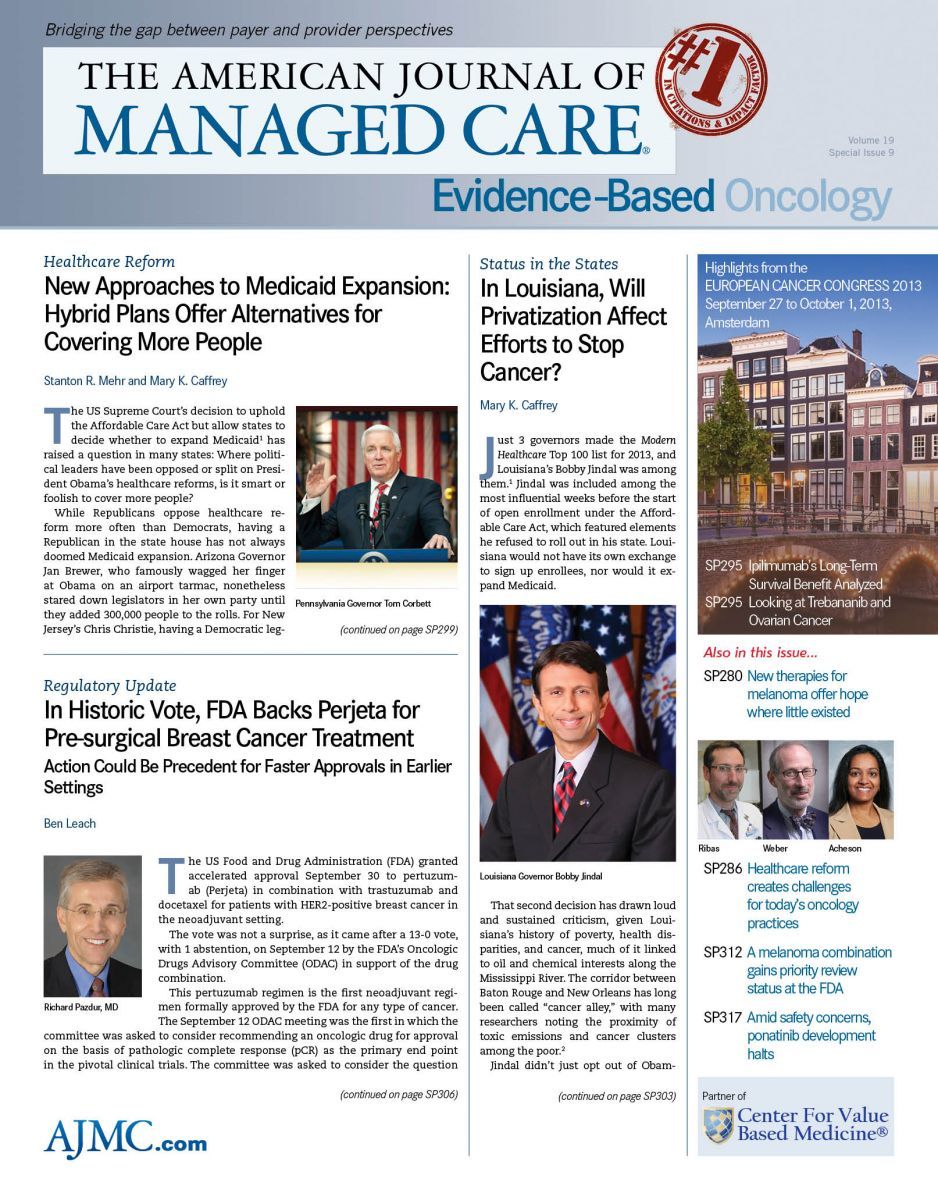- Center on Health Equity & Access
- Clinical
- Health Care Cost
- Health Care Delivery
- Insurance
- Policy
- Technology
- Value-Based Care
Ofatumumab Receives Breakthrough Therapy Designation for Earlier Use in CLL
The monoclonal antibody ofatumumab (Arzerra) has received breakthrough therapy designation from the US Food and Drug Administration (FDA) that could allow for earlier use in patients with chronic lymphocytic leukemia (CLL), according to a joint announcement released by GlaxoSmithKline and Genmab, who have a co-development and commercialization agreement for distributing the drug.
In 2009, ofatumumab was approved for the treatment of CLL that can no longer be controlled by other forms of chemotherapy. This breakthrough therapy designation is for patients who have not received prior treatment and are inappropriate for fludarabine-based therapy.
The breakthrough therapy designation comes on the heels of positive phase III data for ofatumumab that were announced in May. In this study, 447 with previously untreated CLL were randomized to receive either ofatumumab in combination with chlorambucil or chlorambucil alone. The study found that patients in the ofatumumab experienced a median progression-free survival of 22.4 months compared with 13.1 months in the control arm (hazard ratio [HR] = 0.57; P <.001).
The study met its primary endpoint, and there were no unexpected safety findings. Full results for the study have been submitted for presentation at the 2013 American Society of Hematology
(ASH) Annual Meeting and Exposition, taking place in December in New Orleans, Louisiana. Ofatumumab is a human monoclonal antibody that targets the CD20 protein, which is expressed on the surface of both normal and malignant B-cells. This mechanism of action allows for a greater response from the immune system against these cancerous cells.
“We are exceedingly proud to receive the breakthrough therapy designation, the second this year for GSK,” said Kathy Rouan, PhD, vice president and head of biopharmaceutical development at GlaxoSmithKline, in a statement. “This FDA program is intended to expedite not just the development but also the review of drugs for serious or life-threatening conditions. We are actively working on our submission and look forward to the enhanced regulatory interaction allowed for breakthrough therapies.”
Breakthrough therapy designation can be assigned to drugs that appear to be superior to existing treatments for life-threatening conditions. Drugs that receive this designation are allowed an expedited review process, aided by more meetings between the FDA and the manufacturer during the development process, as well as requiring fewer patients for clinical trials and less time
needed to conduct these trials. Ofatumumab is still eligible for fast-track designation, accelerated approval, and priority review, if GlaxoSmithKline and Genmab decide that they want to pursue any of these other designations.
“Both of Genmab’s lead products, ofatumumab and daratumumab, have now been granted breakthrough therapy designations from the FDA,” said Jan van de Winkel, PhD, chief executive officer of Genmab, in a statement. “This designation for ofatumumab reflects Genmab’s mission to create differentiated products aimed at improving the lives of patients suffering from debilitating diseases and for whom existing treatments are inadequate.”

Quality of Life: The Pending Outcome in Idiopathic Pulmonary Fibrosis
February 6th 2026Because evidence gaps in idiopathic pulmonary fibrosis research hinder demonstration of antifibrotic therapies’ impact on patient quality of life (QOL), integrating validated health-related QOL measures into trials is urgently needed.
Read More
Lymphoma Research Foundation CEO on Biden’s Cancer Moonshot, Financial Toxicity
February 3rd 2022On this episode of Managed Care Cast, we speak with Meghan Gutierrez, CEO of the Lymphoma Research Foundation, about financial toxicity, how the pandemic has affected patients’ financial needs when they have cancer, health care disparities and care gaps, and more.
Listen
Keeping Patients With Cancer Out of the ED Through Dedicated Urgent Care
October 13th 2021On this episode of Managed Care Cast, we bring you an interview conducted by the editorial director of OncLive® who talks with the advance practice provider chief at Winship Cancer Institute about how having a dedicated cancer urgent care center will make cancer treatment plans seamless whil helping patients avoid exposure to infectious diseases in emergency department waiting rooms.
Listen
Ambient AI Tool Adoption in US Hospitals and Associated Factors
January 27th 2026Nearly two-thirds of hospitals using Epic have adopted ambient artificial intelligence (AI), with higher uptake among larger, not-for-profit hospitals and those with higher workload and stronger financial performance.
Read More
Motivating and Enabling Factors Supporting Targeted Improvements to Hospital-SNF Transitions
January 26th 2026Skilled nursing facilities (SNFs) with a high volume of referred patients with Alzheimer disease and related dementias may work harder to manage care transitions with less availability of resources that enable high-quality handoffs.
Read More

